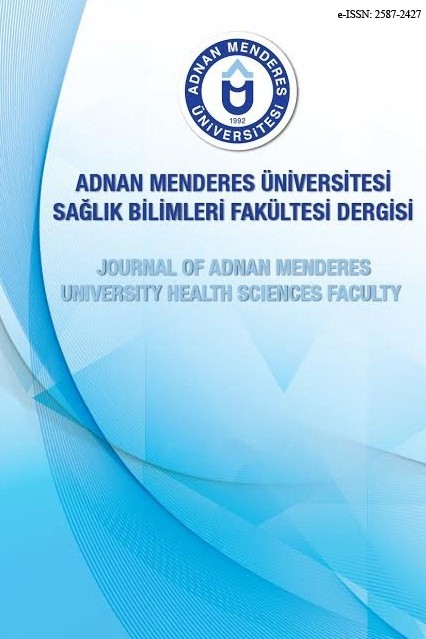Kronik İnmede İnmeli Hastalar için Postüral Değerlendirme Ölçeği'nin Psikometrik Özelliklerinin Berg Denge Ölçeği ve Brunel Denge Değerlendirmesi ile Karşılaştırılması
Denge, Mobilite, Geçerlik, Güvenirlik
Comparison of Psychometric Properties of the Postural Assessment Scale for Stroke Patients with Berg Balance Scale and Brunel Balance Assessment for Chronic Stroke
Balance, Mobility, Validity, Reliability,
___
- 1. Iqbal, K. (2011). Mechanisms and models of postural stability and control. Annual International Conference of the IEEE Engineering in Medicine and Biology Society.Engineering in Medicine and Biology Society. IEEE Annual International Conference, 2011, 7837-7840.
- 2. de Oliveira, C. B., de Medeiros, I. R., Frota, N. A., Greters, M. E. & Conforto, A. B. (2008). Balance control in hemiparetic stroke patients: main tools for evaluation. J Rehabil Res Dev, 45(8), 1215–1226.
- 3. Geurts, A. C., de Haart, M., van Nes, I. J., Duysens, J. (2005). A review of standing balance recovery from stroke. Gait & posture, 22(3), 267-281.
- 4. Goljar, N., Rudolf, M., Bizovicar, N. (2019). Algorithm for selection of balance assessment tools in post-stroke patients. Int J Rehabil Res, 42(3), 229-233.
- 5. Beaton, D., Bombardier, C., Katz, J., Wright, J. (2001). A taxonomy for responsiveness. J Clin Epidemiol, 54(12), 1204-1217.
- 6. Benaim, C., Pérennou, D. A., Villy, J., Rousseaux, M., Pelissier, J. Y. (1999). Validation of a standardized assessment of postural control in stroke patients: the Postural Assessment Scale for Stroke Patients (PASS). Stroke, 30(9), 1862-1868.
- 7. Koçak, F. A., Kurt, E. E,, Koçak, Y., Erdem, H. R., Tuncay, F., Benaim, C. (2019). Validity and interrater/intrarater reliability of the Turkish version of the postural assessment scale for stroke patients (PASS-Turk). Top Stroke Rehabil, 26(5), 373-381.
- 8. Sahin, F., Buyukavci, R., Sag, S., Dogu, B., Kuran, B. (2013). Reliability and validity of the Turkish version of the Berg Balance Scale in patients with stroke. Turk J Phys Med Rehabil, 59(3), 170-176.
- 9. Tyson, S. F, De Souza, L. H. (2004).Development of the Brunel Balance Assessment: a new measure of balance disability post stroke. Clin Rehabil, 18(7), 801-810.
- 10. Aydoğan Arslan, S., Yakut, H., Demirci, C. S., Sertel, M., Kutluhan, S. (2020). The reliability and validity of the Turkish version of Brunel Balance Assessment (BBA-T). Top Stroke Rehabil, 27(1), 44-48.
- 11. Koo, T. K., Li, M. Y. (2016). A guideline of selecting and reporting intraclass correlation coefficients for reliability research. J Chiropr Med, 15(2), 155–163.
- 12. Akoglu, H. (2018). User's guide to correlation coefficients. Turk J Emerg Med, 18(3), 91-93.
- 13. Altman, D. G. (1990). Practical statistics for medical research. CRC press.
- 14. Lesser, M., Borst, J., Dekerlegand, J. (2017). Use of the postural assessment scale for stroke patients in determining acute care discharge recommendations. J Acute Care Phys Ther, 8(3), 79-85.
- 15. Huang, Y. C., Wang, W. T., Liou, T. H., Liao, C. D., Lin, L. F., Huang, S. W. (2016). Postural assessment scale for stroke patients scores as a predictor of stroke patient ambulation at discharge from the
- rehabilitation ward. J Rehabil Med, 48(3), 259-264.
- 16. An, S. H., Lee, J. H. (2009). Reliability and validity of the postural assessment scale for stroke in chronic stroke patients. J Kor Phys Ther, 21(1), 9-17.
- 17. Mao, H. F., Hsueh, I. P., Tang, P. F., Sheu, C. F., Hsieh, C. L. (2002). Analysis and comparison of the psychometric properties of three balance measures for stroke patients. Stroke, 33(4), 1022-1027.
- 18. Bergqvist, G. M., Nasic, S., Persson, C. U. (2019). Inter-rater reliability of the Swedish modified version of the Postural Assessment Scale for Stroke Patients (SwePASS) in the acute phase after stroke.
- Top Stroke Rehabil, 26(5), 366-372.
- 19. Blum, L., Korner-Bitensky, N. (2008). Usefulness of the Berg Balance Scale in stroke rehabilitation: a systematic review. Phys Ther, 88(5), 559-566.
- 20. Liaw, L. J., Hsieh C. L., Lo, S. K., Chen, H. M., Lee, S., Lin, J. H. (2008). The relative and absolute reliability of two balance performance measures in chronic stroke patients. Disabil Rehabil, 30(9), 656- 661.
- 21. Saso, A., Moe-Nilssen, R., Gunnes, M., Askim, T. (2016). Responsiveness of the Berg Balance Scale in patients early after stroke. Physiother Theory Pract, 32(4), 251-261.
- 22. Alghadir, A. H., Al-Eisa, E. S., Anwer, S., Sarkar, B. (2018). Reliability, validity, and responsiveness of three scales for measuring balance in patients with chronic stroke. BMC Neurol, 18(1), 141.
- 23. Cheng, J., Dong, L., Liu, Y., Jing, L., Liu, Y., Wang, Y, et al. (2017). Correlation between reliability and validity of Brunel balance assessment with activities of daily living. Chongqing Medicine, 46(17), 2353-2355,
- 24. Tyson, S. F., Hanley, M., Chillala, J., Selley, A. B., Tallis, R. C. (2007). The relationship between balance, disability, and recovery after stroke: predictive validity of the Brunel Balance Assessment. Neurorehabil Neural Repair, 21(4), 341-346.
- 25. Xiao, L., Luo, Z., Liao, L. (2009). Validity and reactivity of the Chinese version of Brunel balance assessment in stroke hemiplegic patients. Chinese J. Rehabilitation Med., (1):13.
- 26. Wang, C., Sheu, C. F., Protas, E. (2009). Test-retest reliability and measurement errors of six mobility tests in the community-dwelling elderly. Asian J Gerontol Geriatr, 4(1), 8-13.
- Yayın Aralığı: Yılda 3 Sayı
- Başlangıç: 2017
- Yayıncı: Aydın Adnan Menderes Üniversitesi
COVID-19 Süreci ve Fizyoterapide Telerehabilitasyon Uygulamaları: Derleme
Tip 2 Diyabetli Bireylerin Hastalık Yönetiminde Karşılaştıkları Engellerin Değerlendirilmesi
Şuheda ÜSTÜNDAĞ, Nuray DAYAPOĞLU
Cevher DEMİRCİ, Saniye AYDOĞAN ARSLAN, Hatice YAKUT, Meral SERTEL, Süleyman KUTLUHAN
Gastrointestinal Mikroflorayı Desteklemek İçin Bacillus clausii Sporları İçeren Probiyotik Tofu
Nursena ZEYBEKOĞLU, Hatice ÖZHAN, Olcay BOYACIOĞLU
Eda PARA, Yasemin USLU, Yasemin ALTINBAŞ
Biyolojik Temelli Uygulamaların İnfertil Kadınlar Üzerindeki Etkisine Güncel Bir Bakış
Egzersize Bağlı Kilo Kaybı ve Glutatyon S-Transferaz
Adem KESKİN, Aslıhan BÜYÜKÖZTÜRK KARUL
Farklı İskeletsel Yapıdaki Bireylerde Maturasyon İndikatörlerinin Değerlendirilmesi
Anne-Bebek Bağlanmasının Annelik Algısı ve Bazı Değişkenlere Göre İncelenmesi
